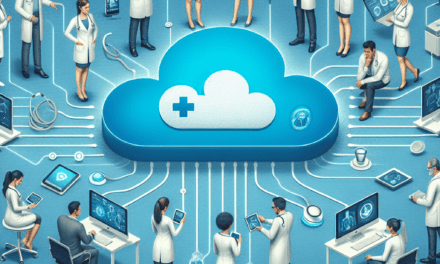Safeguarding Data Privacy and Compliance in Healthcare Analytics
In the rapidly evolving landscape of healthcare, the integration of analytics has become a cornerstone for improving patient outcomes, optimizing operations, and enhancing decision-making processes. However, with the increasing reliance on data comes the pressing need to safeguard data privacy and ensure compliance with regulations. This article delves into the critical aspects of data privacy and compliance in healthcare analytics, exploring the challenges, best practices, and future trends that shape this vital field.
Understanding Data Privacy in Healthcare
Data privacy in healthcare refers to the protection of personal health information (PHI) from unauthorized access and breaches. As healthcare organizations increasingly adopt digital solutions, the volume of data generated has surged, making it imperative to implement robust privacy measures.
The Importance of Data Privacy
Data privacy is crucial for several reasons:
- Patient Trust: Patients expect their health information to be kept confidential. Breaches can lead to a loss of trust, which can deter individuals from seeking necessary medical care.
- Legal Compliance: Healthcare organizations must comply with various regulations, such as the Health Insurance Portability and Accountability Act (HIPAA) in the United States, which mandates strict guidelines for handling PHI.
- Financial Implications: Data breaches can result in significant financial penalties, legal fees, and loss of business. According to a report by IBM, the average cost of a data breach in healthcare was $9.23 million in 2021.
Types of Data at Risk
Healthcare analytics often involves various types of data, each with its own privacy concerns:
- Electronic Health Records (EHRs): These contain comprehensive patient information, including medical history, medications, and treatment plans.
- Genomic Data: As personalized medicine gains traction, genomic data poses unique privacy challenges due to its sensitivity and potential for misuse.
- Wearable Device Data: Data collected from wearables can provide insights into patient health but also raises concerns about consent and data ownership.
Challenges in Data Privacy
Despite the importance of data privacy, healthcare organizations face several challenges:
- Complex Regulations: Navigating the myriad of regulations can be daunting, especially for smaller organizations with limited resources.
- Data Silos: Many healthcare organizations operate in silos, making it difficult to implement consistent privacy measures across all departments.
- Cybersecurity Threats: The healthcare sector is a prime target for cyberattacks, with ransomware attacks increasing by 123% in 2020, according to a report by Cybersecurity Ventures.
Regulatory Frameworks Governing Healthcare Data
Compliance with regulatory frameworks is essential for safeguarding data privacy in healthcare analytics. Various laws and regulations govern how healthcare organizations must handle patient data.
HIPAA: The Cornerstone of Healthcare Compliance
The Health Insurance Portability and Accountability Act (HIPAA) is a federal law that sets the standard for protecting sensitive patient information. Key provisions include:
- Privacy Rule: Establishes national standards for the protection of PHI, giving patients rights over their health information.
- Security Rule: Sets standards for safeguarding electronic PHI (ePHI) through administrative, physical, and technical safeguards.
- Breach Notification Rule: Requires covered entities to notify patients and the Department of Health and Human Services (HHS) in the event of a data breach.
Other Relevant Regulations
In addition to HIPAA, several other regulations impact healthcare data privacy:
- General Data Protection Regulation (GDPR): For organizations operating in the European Union, GDPR imposes strict rules on data processing and privacy rights.
- Health Information Technology for Economic and Clinical Health (HITECH) Act: Strengthens HIPAA rules and promotes the adoption of electronic health records.
- State-Specific Laws: Many states have their own privacy laws that may impose additional requirements beyond federal regulations.
Compliance Challenges
While regulations are in place to protect patient data, compliance can be challenging:
- Resource Constraints: Smaller healthcare organizations may lack the resources to implement comprehensive compliance programs.
- Rapid Technological Changes: The fast pace of technological advancements can outstrip existing regulations, creating gaps in compliance.
- Employee Training: Ensuring that all staff members are trained on compliance requirements is essential but can be difficult to achieve consistently.
Best Practices for Data Privacy and Compliance
To effectively safeguard data privacy and ensure compliance, healthcare organizations should adopt best practices tailored to their specific needs and challenges.
Implementing Robust Security Measures
Security measures are the first line of defense against data breaches. Key strategies include:
- Encryption: Encrypting sensitive data both at rest and in transit can protect it from unauthorized access.
- Access Controls: Implementing role-based access controls ensures that only authorized personnel can access sensitive information.
- Regular Audits: Conducting regular security audits can help identify vulnerabilities and ensure compliance with regulations.
Developing a Comprehensive Data Governance Framework
A robust data governance framework is essential for managing data privacy and compliance:
- Data Classification: Classifying data based on sensitivity can help organizations prioritize protection efforts.
- Data Lifecycle Management: Establishing policies for data retention, archiving, and disposal can minimize risks associated with outdated information.
- Incident Response Plan: Developing a clear incident response plan can help organizations respond effectively to data breaches.
Employee Training and Awareness
Human error is a significant factor in data breaches. Therefore, ongoing training and awareness programs are crucial:
- Regular Training Sessions: Conducting regular training sessions on data privacy and security best practices can help employees stay informed.
- Phishing Simulations: Running phishing simulations can help employees recognize and respond to potential threats.
- Creating a Culture of Privacy: Encouraging a culture of privacy within the organization can empower employees to take data protection seriously.
The Role of Technology in Enhancing Data Privacy
Technology plays a pivotal role in safeguarding data privacy and ensuring compliance in healthcare analytics. Emerging technologies offer innovative solutions to address privacy challenges.
Artificial Intelligence and Machine Learning
AI and machine learning can enhance data privacy in several ways:
- Anomaly Detection: AI algorithms can analyze data patterns to detect unusual activities that may indicate a breach.
- Data De-identification: Machine learning techniques can help de-identify patient data, allowing for analytics without compromising privacy.
- Predictive Analytics: AI can predict potential security threats, enabling organizations to take proactive measures.
Blockchain Technology
Blockchain technology offers a decentralized approach to data management, enhancing security and transparency:
- Immutable Records: Once data is recorded on a blockchain, it cannot be altered, reducing the risk of tampering.
- Enhanced Consent Management: Blockchain can facilitate better consent management, allowing patients to control access to their data.
- Secure Data Sharing: Blockchain enables secure sharing of data among authorized parties without compromising privacy.
Cloud Computing and Data Security
Cloud computing has transformed healthcare analytics, but it also raises privacy concerns. Best practices include:
- Choosing Reputable Providers: Organizations should partner with cloud providers that prioritize data security and compliance.
- Data Encryption: Encrypting data stored in the cloud can protect it from unauthorized access.
- Regular Security Assessments: Conducting regular assessments of cloud security measures can help identify vulnerabilities.
Future Trends in Data Privacy and Compliance
The landscape of data privacy and compliance in healthcare analytics is continually evolving. Several trends are shaping the future of this field.
Increased Focus on Patient-Centric Privacy
As patients become more aware of their data rights, healthcare organizations are shifting towards a patient-centric approach to privacy:
- Empowering Patients: Organizations are providing patients with more control over their data, including the ability to access and share their health information.
- Transparency Initiatives: Many organizations are adopting transparency initiatives to inform patients about how their data is used and protected.
- Patient Education: Educating patients about data privacy can foster trust and encourage responsible data sharing.
Regulatory Evolution
As technology advances, regulations will continue to evolve to address new challenges:
- Global Standards: There is a growing push for global standards in data privacy, which could simplify compliance for multinational organizations.
- Stricter Penalties: Regulatory bodies may impose stricter penalties for non-compliance, emphasizing the importance of robust privacy measures.
- Focus on Emerging Technologies: Future regulations may specifically address the use of AI, blockchain, and other emerging technologies in healthcare.
Collaboration and Information Sharing
Collaboration among healthcare organizations, regulators, and technology providers will be essential for enhancing data privacy:
- Industry Partnerships: Collaborating with industry partners can facilitate knowledge sharing and best practices for data privacy.
- Public-Private Partnerships: Engaging in public-private partnerships can help address systemic privacy challenges in healthcare.
- Information Sharing Networks: Establishing networks for sharing information about threats and vulnerabilities can enhance overall security.
Conclusion
As healthcare analytics continues to evolve, safeguarding data privacy and ensuring compliance remain paramount. Organizations must navigate complex regulations, implement robust security measures, and leverage technology to protect sensitive patient information. By adopting best practices, fostering a culture of privacy, and staying informed about emerging trends, healthcare organizations can build trust with patients and enhance their overall data governance strategies. The future of healthcare analytics will depend on a commitment to data privacy and compliance, ensuring that patient information is protected while harnessing the power of data to improve health outcomes.





